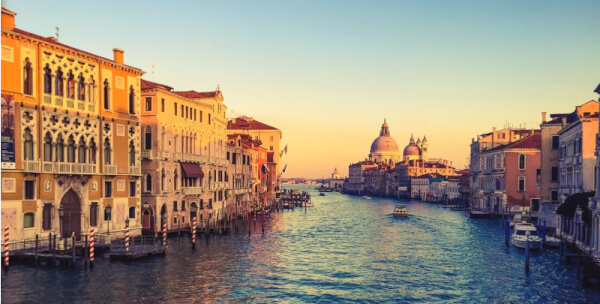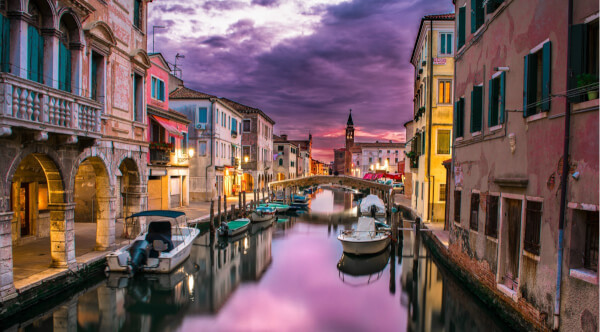Getting married in Italy: A complete guide
Getting married in Italy is relatively straightforward. Like any wedding though, it requires advanced planning, as well as a basic understanding of the law....

Dreaming of moving to Italy and starting a new life there? You’re not alone, since almost 30,000 UK citizens already live there.¹
Italy is a beautiful country to relocate to, especially when you’re escaping gloomy UK weather. The mountains and the seaside, as well as the cuisine and the art are only a few things to look forward to. Italians are warm and welcoming, so expats usually feel comfortable in their new home.
In this guide, we’ll cover all the essentials you need to know about moving to Italy from the UK. This includes how to get a visa, what has changed for Brits post Brexit, the cost of living and the options for retiring in Italy.
We’ll also point out the most cost-effective way to manage your money across borders. Open a Wise multi-currency account and you can send money between the UK and Italy for low fees and the fairest exchange rate around.
But first, let’s begin with some basics you need to know before moving.
Before permanently moving to any country, it’s good to know what you can expect when it comes to living costs. The cost of living in Italy is lower in comparison to the UK in lots of areas, but some prices depend on where you live.
To give you an idea of average prices in Italy, here are a few examples you might find helpful:
| Cost in Italy | Cost in UK | |
|---|---|---|
| Three-course meal for two people | £51.81 | £60 |
| Loaf of bread | £1.52 | £1.07 |
| Draught beer (0.5l) | £4.32 | £4.5 |
| Monthly public transport pass | £30.22 | £67 |
| Utilities - monthly | £167.16 | £208.32 |
When it comes to finding somewhere to live in Italy, you can expect rent prices to be over 50% lower than in the UK on average. This varies from city to city and according to the location of your apartment.
If you’d like to buy an apartment instead of renting, the difference can be even more noticeable. You can even pay 80% less if you’re purchasing an apartment outside of the city centre.
The Italian version of the NHS is called Servizio Sanitario Nazionale (SSN). Those that are employed, whether they work for someone or they’re self-employed, can access healthcare for free. This is called iscrizione obbligatoria and it’s different from iscrizione volontaria, which is reserved for unemployed residents. Those that need more coverage or comfort usually invest in private health insurance.
In Italy, you can expect to get free GP appointments and hospital admissions. However, you need to pay for specialist referrals, prescription medication or different tests. Also, you can add your dependents to your health insurance.
In order to register for healthcare in Italy, you must at least apply for a residence permit. You’ll then provide that permit or the application receipt, your passport and your tax number to your local health authority (Azienda Sanitaria Locale or ASL). You might need to show additional documents and pay certain fees, but it’s best to ask your ASL directly.
If you’re a legal resident in Italy and you receive a UK State Pension, the UK might be the one responsible for your healthcare. You can find more information on this as well as how to apply using the S1 form on the UK Government’s website.
In order to open a bank account in Italy, you usually need to visit a bank branch at least once. There are accounts for both residents and non-residents.
The process can vary slightly from bank to bank, but you’ll usually need to show them your ID and your Italian tax code called codice fiscale. The banks always perform Anti Money Laundering (AML) formalities and ask you to sign some paperwork.
You can even open a bank account before coming to Italy if you pick an Italian or international bank that has a branch in both countries. It also has to be able to perform AML compliance formalities and pass the information to the Italian branch.
Another important thing to have in mind is that many banks won’t have English-speaking staff, so you might want to take an Italian-speaking friend along to translate.
Since finding a suitable job for you can be a long and tiring process, it’s best to start searching even before you officially move. A good first step is researching the job market and getting an idea of what you can expect to see. Also, learning Italian will open many doors for you.
Italy’s leading sectors are steel, tourism, agriculture, textile and cars. There are plenty of job opportunities available, especially if you’re an engineer, IT expert or a healthcare worker. However, depending on your profession, you might need to transfer education qualifications. Make sure you look up whether you fall into this category.
Here are some of the most popular job seeking websites in Italy:
For those that haven’t yet learned Italian, there are also websites for jobs in English. Some popular examples are The Local and Glassdoor.
Finding a place to live is one of the most important things to do when moving to a new country. It’s also one of the most time consuming tasks, so make sure you start in time, no matter whether you’re renting or buying.
Over 70% of Italians are homeowners and it’s not an impossible thing to achieve.⁹ Like we mentioned, property prices in Italy are much lower than in the UK. Here are some popular websites that can be a good starting point:
Many people prefer to rent instead, at least in the beginning. That way it’s easier to get used to your new country of residence and decide where you want to settle down permanently. Besides the websites listed above, it might be a good idea to consult a real estate agent that could help you through the entire process.
Since Brexit, UK citizens have to apply for a visa in order to live and work in Italy. It’s still possible to move, but it involves more paperwork than before.
There are multiple visa types that UK citizens can apply for. We’ll explain the most popular ones so you know which one suits you best.
Italian visas come in many different types, depending on the reason for their issuing. Some of them are family visas, study visas, work visas, mission visas, religious visas and many more.
Visas are available through the Italian embassy or specialized visa application centres. The exact documents you’ll need to provide depend on the type of visa you want. However, the following is usually required:
Another option is Italy’s Golden Visa, which is a long-stay visa given to those who make certain investments in Italy. Examples are investments in government bonds, startups or philanthropic causes. The first step in the application is getting the certificate of no impediment called Nulla Osta. You should then head to the Italian embassy where you’ll continue the process and get all the necessary information.¹¹
After getting a visa and entering Italy, you have eight days to apply for a temporary residence permit. People usually apply at post offices, police headquarters or Unique Immigration Desks (Sportello Unico per l’Immigrazione).
Dreaming of fresh pasta and sunshine during your retirement days? Here’s what you need to know beforehand:
You can retire in Italy as long as you can prove that you have sufficient funds and won’t depend on Italian social security. Italian Elective residence visas are great for retirees. Those who have sufficient income and can support themselves during their stay are good candidates. At the moment, the bar is set at €30,000 a year, but make sure you check for updated information.
The Elective visa is valid for two years, but you can renew it for up to five years.
You can claim your UK State Pension in Italy, but you have to apply at the International Pensions Centre first. You’ll need to send them the international claim form and later let them know whether you want your pension paid into your Italian bank account.
If you choose to do so, it will be paid in the local currency. You’ll also be able to choose how often you’ll get paid - it can be anywhere from 4 to 13 weeks.
Since Brexit happened, moving your belongings to Italy is a more complicated process. It’s best to consult an experienced relocation company and get some professional help.
When it comes to importing your household goods tax-free, there are some conditions you need to fulfill:
An experienced shipping company that understands the way Italian customs work will be of great help.
Don’t know where to start with the list of things to do before your move to Italy? Here’s a checklist covering some of the main tasks you should focus on:
Need to pay rental deposits or visa application fees before relocating to Italy? You might want to consider options other than your bank.
Using a Wise multi-currency account to cover international moving costs could be cheaper than using your bank. With Wise, you can send money between the UK and Italy for small, transparent fees and mid-market exchange rate.
You can also use Wise to receive income from the UK (such as pension payments) in GBP. This helps you avoid high conversion fees and exchange rates your bank will most likely have. Once the payment lands in your Wise account, you can convert it to EUR for lower fees and the real, mid-market exchange rate.
And before you officially open an Italian bank account, you can use your international Wise debit card to spend like a local from the moment you arrive. The card automatically converts to EUR at the fairest rate whenever you use it, so you don’t need to worry about exchanging money. All you’ll need is the one debit card for low-cost spending in 170+ countries.
Pricing/fees: Please see Terms of Use for your region or visit Wise Fees & Pricing for the most up to date pricing and fee information.
Sources used for this article:
Sources checked on 07-Aug-2023.
*Please see terms of use and product availability for your region or visit Wise fees and pricing for the most up to date pricing and fee information.
This publication is provided for general information purposes and does not constitute legal, tax or other professional advice from Wise Payments Limited or its subsidiaries and its affiliates, and it is not intended as a substitute for obtaining advice from a financial advisor or any other professional.
We make no representations, warranties or guarantees, whether expressed or implied, that the content in the publication is accurate, complete or up to date.

Getting married in Italy is relatively straightforward. Like any wedding though, it requires advanced planning, as well as a basic understanding of the law....

There’s truly something for everyone in Italy. You might want to live in the cultural heart of Rome, the fashion and finance centre of Milan, or off the...

Check our comprehensive guide on how to get an Italian citizenship and all the benefits it offers.

Here’s the lowdown on who can apply and how you go about getting dual citizenship with Italy.

Have you ever considered moving abroad? There are a ton of valid reasons to do so. You could be looking for a new job or going to school. You could be...

So, you’ve watched La vita è bella (Life Is Beautiful, 1977) one too many times and have decided to move to Italy. Great choice, although hopefully you have...